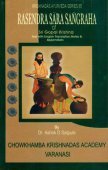Kotha, Kōṭha, Koṭha: 18 definitions
Introduction:
Kotha means something in Hinduism, Sanskrit, Marathi, Hindi, biology. If you want to know the exact meaning, history, etymology or English translation of this term then check out the descriptions on this page. Add your comment or reference to a book if you want to contribute to this summary article.
Kotha has 17 English definitions available.
Languages of India and abroad
Sanskrit dictionary
[Deutsch Wörterbuch]
Source: Cologne Digital Sanskrit Dictionaries: Böhtlingk and Roth Grosses Petersburger WörterbuchKoṭha (कोठ):—m. eine Art Ausschlag mit rothen Flecken [Amarakoṣa 2, 6, 2, 5.] [Hemacandra’s Abhidhānacintāmaṇi 467.] [Suśruta 1, 156, 3. 11. 2, 140, 16.] [Weber’s Verzeichniss No. 975.] — Wohl aus kuṣṭha entstanden.
--- OR ---
Kotha (कोथ):—(von kuth) m.
1) Fäulniss, Verwesung: mūtrapurīṣakotha [Suśruta 1, 41, 9. 10. 170, 15. 2, 292, 20.] —
2) ein faulendes Geschwür: snāyumāṃsasirākotha [Suśruta 1, 92, 4. 266, 16. 2, 369, 16.] gangrene [Wilson’s Wörterbuch] —
3) eine best. Augenkrankheit [Hemacandra’s Anekārthasaṃgraha 2, 213.] [Medinīkoṣa th. 5.] inflammation, and ulceration of the angles of the eyelids [Wilson’s Wörterbuch] — Nach [Hemacandra’s Anekārthasaṃgraha] und [Medinīkoṣa] ausserdem noch das Quirlen (mathana) und adj. = śaṭita, afflicted with pain [Wilson’s Wörterbuch] [Śabdakalpadruma] angeblich nach denselben Autorr.: = mathita gequirlt.
Source: Cologne Digital Sanskrit Dictionaries: Sanskrit-Wörterbuch in kürzerer FassungKoṭha (कोठ):—m. eine Art Ausschlag mit rothen Flecken.
--- OR ---
Kotha (कोथ):——
1) m. — a) Fäulniss , Verwesung. — b) ein faulendes Geschwür. — c) *eine best. Augenkrankheit. — d) *das Quirlen. —
2) *Adj. = śaṭita oder mathita.
Sanskrit, also spelled संस्कृतम् (saṃskṛtam), is an ancient language of India commonly seen as the grandmother of the Indo-European language family (even English!). Closely allied with Prakrit and Pali, Sanskrit is more exhaustive in both grammar and terms and has the most extensive collection of literature in the world, greatly surpassing its sister-languages Greek and Latin.
See also (Relevant definitions)
Starts with (+58): Kotaiyan, Kotakotu, Kotal, Kotanam, Kotantam, Kotantapani, Kotantaveli, Kotanti, Kotaranam, Kotari, Kotati, Kotha korintha, Kotha-vyapara, Kothaca, Kothadi, Kothaka, Kothako, Kothakothi, Kothala, Kothalahimbutu.
Ends with (+1): Adakotha, Ankotha, Chakkotha, Damshakotha, Huchchu-chakkotha, Huchu chakotha, Ippatikkotta, Jiuti-kotha, Malaca Kotha, Malaca-kotha, Mutraca Kotha, Mutraca-kotha, Nuhaune-kotha, Nuhoune-kothaa, Prakotha, Pujakotha, Snanakotha, Susajjita-kotha, Sutne-kotha, Utkotha.
Full-text (+26): Koha, Nuhoune-kothaa, Malaca Kotha, Mutraca-kotha, Kothya, Mutraca Kotha, Malaca-kotha, Kothaka, Kotha korintha, Utkotha, Kotha-vyapara, Kothara, Carmadushika, Kotharapushpi, Prakotha, Prakothodaka, Kacumalai, Mankaymalai, Muttuccalli, Kotakotu.
Relevant text
Search found 15 books and stories containing Kotha, Kōṭha, Koṭha, Kōṭhā, Koṭhā, Kothaa; (plurals include: Kothas, Kōṭhas, Koṭhas, Kōṭhās, Koṭhās, Kothaas). You can also click to the full overview containing English textual excerpts. Below are direct links for the most relevant articles:
The history of Andhra country (1000 AD - 1500 AD) (by Yashoda Devi)
Part 40 - End of the Sila (Silavamsi) dynasty < [Chapter XIII - The Dynasties in South Kalinga]
Folk Tradition of Bengal (and Rabindranath Tagore) (by Joydeep Mukherjee)
Chapter 5.3 - Prosodic similarity between Lalon Fakir and Rabindranath Tagore
Chapter 5.5 - An Initiative to Change after Lalon Fakir
Śrī Kṛṣṇa-vijaya (by Śrī Gunaraja Khan)
Jainism in Odisha (Orissa) (by Ashis Ranjan Sahoo)
The Garuda Purana (by Manmatha Nath Dutt)
Chapter CLXV - The Nidanam of Bodily parasites < [Dhanvantari Samhita]
The Agni Purana (by N. Gangadharan)
Related products

